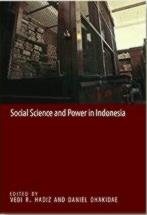Dalam artikel yang sama, sebuah buku baru juga dirujuk, Social Science and Power in Indonesia. Berikut ini disertakan satu ulasan ringkas buku tersebut (Oh ya! Sebelum membaca book review ini, tolong lihat foto di kulit depan buku ini. Apakah ada sesuatu yang ganjil?):
 Social Science and Power in Indonesia is a provocative and engaging collection of essays expertly edited by two seasoned scholars of Indonesian politics, Vedi Hadiz and Daniel Dhakidae.
Social Science and Power in Indonesia is a provocative and engaging collection of essays expertly edited by two seasoned scholars of Indonesian politics, Vedi Hadiz and Daniel Dhakidae.According to the editors, the book's premise is that "the role and development of social sciences in Indonesia over the past 50 years are inextricably related to the shifting requirements of power". By power, the authors largely mean state power and they refer mostly to the power of Suharto's New Order regime.
Opening with a comprehensive introduction, the ensuing chapters address a range of issues -- dominant ideological paradigms, acceptable research topics, the design of higher education, the role of think tanks -- all with an eye toward understanding how these interacted with political objectives of the state.
In this context, a central contribution of this book is to show the novel ways by which the New Order achieved and maintained political dominance for so long.
Much has been written about how the military attained order through coercion while the technocrats secured the state's legitimacy through economic growth.
Social Science and Power adds a new dimension whereby knowledge-makers and their institutions were subsumed under the state and used to consolidate its basis of control.
To be sure, the authors are careful to point out the existence of major conflicts in ideology and discourse that influenced state policy in the New Order. For example, some chapters refer to neo-liberal economic thought and state-led developmentalist policies that coexisted uneasily under the New Order. This suggests that even strong authoritarian states can contain internal rifts and ideological contradictions.
But the authors do not turn a blind eye to the wider contribution of intellectuals and activists outside the mainstream that tried to challenge the dominant paradigms of social science at the time.
Even in their marginality, non-governmental organizations and alternative media outlets emphasized social and community empowerment programs and participatory research methodologies, much of which can be seen to form the basis for Indonesian civil society organizations today.
[Untuk lengkap, ke sini: Power-Ideology Balance over 50 Years oleh Ehito Kimura, The Jakarta Post, February 20, 2005]
Untuk ulasan dalam bahasa Indonesia, Hantu Orde Baru oleh Herry-Priyono (Kompas, 22 January 2005)



No comments:
Post a Comment